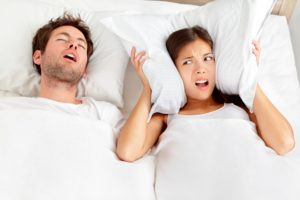 Are you tired of your spouse poking you in the ribs at night because you won’t stop snoring? Don’t worry, the American Sleep Apnea Association reports 90 million Americans are in the exact same boat. It’s normal for everyone to snore occasionally, which is harmless; however, there are times it can be a sign of a serious problem. Research shows as much as 40% of snorers have a disorder called sleep apnea, which causes several pauses in breathing throughout the night, but not all patients who snore have sleep apnea. Here’s what you need to know to ensure your snoring it’s a symptom of a big problem.
Are you tired of your spouse poking you in the ribs at night because you won’t stop snoring? Don’t worry, the American Sleep Apnea Association reports 90 million Americans are in the exact same boat. It’s normal for everyone to snore occasionally, which is harmless; however, there are times it can be a sign of a serious problem. Research shows as much as 40% of snorers have a disorder called sleep apnea, which causes several pauses in breathing throughout the night, but not all patients who snore have sleep apnea. Here’s what you need to know to ensure your snoring it’s a symptom of a big problem.
What Causes Snoring?
Both men and women can snore, even children. It’s caused by the upper airway narrowing as you sleep, which creates a partial blockage from the soft tissues in the back of your mouth relaxing. When you take a breath, the tissues will vibrate and cause a distinctive sound from the air flow.
Snoring can be caused by various factors, like nasal congestion. Typically, it isn’t a sign of anything concerning, but if the problem is chronic, it can indicate obstructive sleep apnea, which is a serious condition that needs to be treated by a sleep doctor.
What is Obstructive Sleep Apnea?
According to the American Sleep Association, 25 million people in the U.S. have obstructive sleep apnea. The sleep disorder in Greenfield results from the soft tissues in the back of the mouth and throat collapsing to create an obstruction.
Although snoring is one of the most prevalent symptoms, it’s not the only concern. You can stop breathing hundreds of times per night with each event lasting for potentially 1 minute or longer. This causes inadequate oxygen levels, which will strain several systems in your body. If you don’t get treatment, you will have an increased risk of multiple health issues, like cardiovascular disease, depression, and sleep deprivation.
What are Common Signs of Sleep Apnea?
Sleep apnea can cause a variety of symptoms you might not believe are related to a breathing issue, such as:
- Waking choking or gasping for air.
- Dry mouth or sore throat.
- Morning headaches.
- Daytime sleepiness.
- Difficulty concentrating.
- Changes to mood or irritability.
- Nighttime sweating.
How Can I Treat Sleep Apnea?
You will need a sleep study to confirm the condition to get an effective treatment solution using a customized plan. A CPAP is the most traditional option, which relies on a steady stream of air through a mask worn over the mouth or nose to stop pauses in breathing. As an alternative to the machine, many patients are choosing an oral appliance to reposition the lower jaw forward. This keeps the airway open to breathe better and get the rest you need.
Don’t let snoring keep you or your partner awake any longer. Sleep better and stop your snoring with oral appliance therapy.
About BGH Dental
BGH Dental combines the qualifications and experience of our reputable dentists to provide exceptional services to the community. We offer many specialty treatments, including oral appliance therapy. If you struggle with snoring or suspect you have sleep apnea, contact our office today for a consultation.


